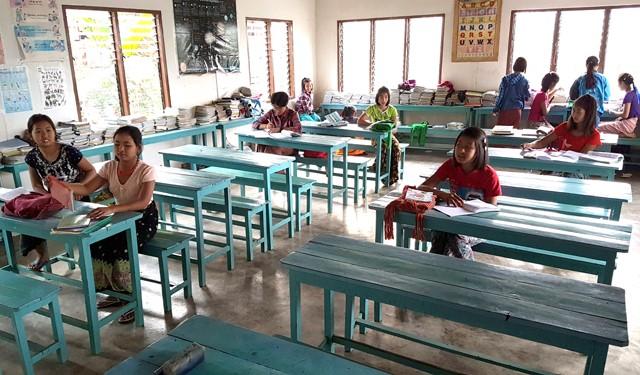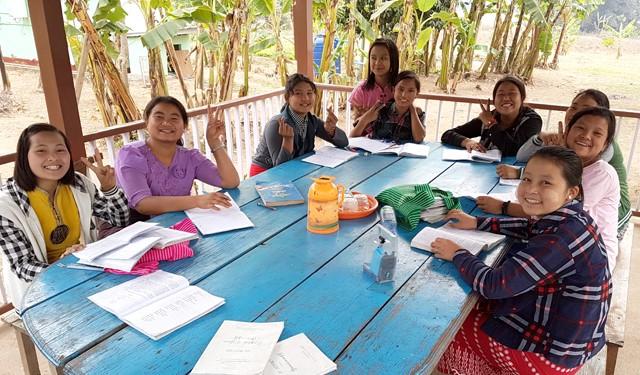Education & Vocational Training
School System in Myanmar
Myanmar has a primary school (grade 1 to 5), middle school (grade 6 to 9) and high school (grade 10 to 12). At the school in Minethouk, where all our girls and boys go to school, these three levels are offered. There are about 350 students at this government school.
The young people who go to high school can choose from two directions:
- Bio-line: Mathematics, Physics, Chemistry, Biology, Burmese Language and English.
- Eco-line: Mathematics, Physics, Chemistry, Economics, Burmese Language and English.
Until recently, the high school consisted of two grades: grade 10 and 11. The education system has recently been renewed by the Ministry of Education. A year has been added to high school and all exams have been rewritten. From now on, more will be tested on insight and not just on the reproduction of knowledge and facts (rote learning).
All the girls and boys in our homes are tutored after school by our staff members. This is often still done in the traditional way. It will take a while before the rote learning system is banned.

Opportunities after graduation
A follow-up study is something that many young people in Myanmar do not think about. Most young people find it more important to earn money as soon as possible after high school in order to support their family. However, many of our youth have no parents. Our staff members therefore encourage the girls and boys to think carefully about further studies and their future.
Unfortunately, only a small part of the young people pass the high school exam the first time. Some try again and others prefer to attend some vocational training. The latter group can attend these trainings in the nearby town of Nyaung Shwe.
However, we prefer that the young people repeat a year and still obtain their high school diploma. Then there are various possibilities to continue studying. If the grades are good, the young people can go on to teacher training, nursing training, agricultural training or university.
The young people who have obtained their secondary school diploma with lower grades can go to the part-time university in the city of Taunggyi at the expense of the foundation. They then attend college for three months a year. In the other months they work on a number of assignments and can also go to work and earn some money. Studying at a part-time university takes an average of four years. Those who pass will receive the title bachelor of science.
After graduating from high school, young people always have to wait one year before they can go to further education. That is why every year a few young people continue to live in the orphanages and help out as volunteers, pending placement for further education.

Collaboration with the World Child Care Foundation
The collaboration between the Care for Children Foundation and the World Child Care Foundation offers young people in the orphanages in Minethouk future prospects. The World Child Care Foundation can annually allow a number of young people to participate in their English & Life Skill Program at the PDO High School in the city of Mandalay. The young people learn to speak good English, obtain a Cambridge certificate and participate in training in self-confidence, self-knowledge, critical thinking, debating, communication, active citizenship and environmental awareness.
In education, healthcare, ICT, business and especially in tourism around Inle Lake, the demand for talented and good English speaking young people is high. With the certificates in hand, the chance of a good job and an independent existence is a lot greater. The Care for Children Foundation supports the World Child Care Foundation in a modest way to create a study and workplace in Mandalay for a number of young people from Minethouk. It is good to know that this was still approved by the old board during the period when both foundations started working together.

